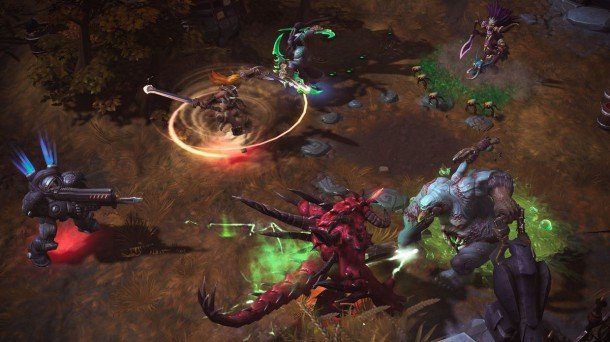
Illustration by Marsh Davies
All week long, we're peering ahead to what the future holds for the PC gaming industry . Not just the hardware and software in our rigs, but how and where we use them, and how they impact the games we play. Here's the final entry in our five-part series.
By 2020, cars will fly and the DeLorean will make a successful comeback. The Large Pixel Collider will usher in a new age of global prosperity as President of Earth. Half-Life 3 will, finally, be close to release. Those are just a few of our wildest predictions for what's on the horizon. Below we throw caution to the wind to make our boldest predictions about the future of PC gaming and a variety of genres, from shooters to RPGs and MOBAs.
Shooters
Tyler: Half-Life 3 will be released. Right?
Cory: Wrong.
Evan: These three things are only going to become more ubiquitous: map deformation, scale, and detailed match analytics and stat-tracking a la Battlelog. As bandwidth and server tech improves, we're absolutely going to see more MMOFPSes--we love PlanetSide 2, but it also conveys what technological obstacles still exist for devs that want to make a twitchy, massive-scale, persistent FPS. Stuff like The Division is a stepping stone to that.
Tyler: The trend of merging traditionally single-player experiences with multiplayer—as seen in The Division and Titanfall —will balloon as publishers view “connected” single-player experiences as a bonus to their games' longevity. And less cynically, it's just a cool idea we want to experiment with more, and I expect developers do too.
Keep up to date with the most important stories and the best deals, as picked by the PC Gamer team.
Purely single-player FPSes won't go away, but they'll continue to be adorned with storytelling, RPG systems, loot grabbing, puzzles, and so on. Attempts to revisit corridor shooters and keycard puzzles haven't been met with much success lately. That said, basic shooting mechanics are generally the most criticized part of today's shooters (e.g. BioShock Infinite), so I expect more focus on generating real tactical choices and meaningfully different weapons, and for simulation and permadeath to rise up next to scripted events and checkpoints.
Samuel: I agree with Tyler in the idea that single-player shooters, maybe even other genres, will be elevated by these online elements. Dare I use the term 'mingleplayer'? No, I couldn't live with myself.

Role-Playing Games
Wes: Japanese RPGs are going to see a big resurgence on the PC. Japanese devs have already tested the waters by porting game series like Ys to the PC. As big names like Square Enix do the same, they'll find surprising success--and a hardcore audience eager for more of their games. By the end of this console generation, most of the big JRPG series will have PC ports.
Samuel: I agree with Wes on this front. Serious money has been left on the table over the years by Square Enix going console-only. I'd like to see Final Fantasy XV on PC, though as ever with the publisher's RPG release timeframes, I'm not expecting this to happen before 2026. What'll be interesting in this genre is how it'll be affected by the evolution of open world design. This three-way competition in both scale and detail at CD Projekt Red, BioWare and Bethesda will create increasingly ambitious environments that can facilitate less scripted storylines.
Evan: We'll see more systems-driven RPGs in general, thank goodness. Shadow of Mordor's open-ended recruitment, assassination, and enemy rivalry systems are a hint at developers' move away from storytelling that's 100-percent scripted.
Tyler: Non-player characters will stop being cardboard standups with three dialogue input buttons and canned responses. Type in what you want to say, or speak it out loud, and they will react naturally. Dialogue might still be authored and not all AI-driven, but it will be harder to tell that we're interacting with programmed people and a predetermined series of events. BioWare will be one of the first to advance AI programming, and we can expect new RPG series out of it as Dragon Age and Mass Effect start to lose their luster.
MMOs
Cory: Outlook: not so good. Blizzard wants to create annual expansions for WoW, while games such as Neverwinter and The Secret World have struggled to find an audience. Even SOE doesn't think MMOs can last in their current form—that's why EverQuest Next Landmark is taking so many cues from Minecraft.
Tyler: What happened to that old dream of cyberspace? You know, a virtual universe where we meet with friends in grand digital cities, rejecting all physical interaction for a better, virtual version of reality? Oh yeah, Second Life happened. But I won't let that get me down—MMOs won't go away, but as Cory points out, they won't be so D&D or WoW inspired. No more repeating the same raid over and over for XP—old-style game design will only exist in niche games. The big MMO worlds of the future will be built by the players, combat will be de-emphasized, and more advanced simulation systems will work together to create dynamic worlds with more meaningful things to do. Think EverQuest plus DayZ plus Minecraft plus SimCity plus Neuromancer.

MOBAs
Cory: How long can Dota 2 and League of Legends be the top MOBAs? It's been a good ride, but it can't last forever. I predict that Blizzard's own version, Heroes of the Storm , ends up poaching a lot of players from both games.
Wes: I predict Blizzard will put a ton of money and marketing muscle behind Heroes of the Storm, but their MOBA won't have much staying power against League and Dota 2. League of Legends will continue its dominance as The Biggest Freaking Game Ever for years.
Simulations
Tyler: The simple answer: they'll get more accurate. Physics modeling will be so advanced, a car crash in a game will be indistinguishable from a real car crash. A Supermarine Spitfire will fly exactly as a Spitfire should, with all the moving parts simulated. Add in VR support and the appropriate control peripherals, and all that will be missing is the smell of exhaust.
Cory: The space sim genre in particular will stand on the shoulders of Star Citizen. I think the game will be fantastic, even in modular chunks, and with its success, we'll see a renaissance in space combat sims. I can't wait.
Sports
Tim: EA will finally deign to include it's 'next-gen' Ignite engine in the PC version of FIFA 15, and we shall look over the greater variety of animation and noticeably more complex AI-driven behavior of our teammates, and lo it shall be good. (If not completely revolutionary.) There will probably also be a brief flirtation with the idea of first-person sports games played in the Rift, although baseball is the only sport it makes any kind of sense to attempt with. And there's still a strong chance you'd lose your lunch while sprinting past second base.
PC Gamer is the global authority on PC games—starting in 1993 with the magazine, and then in 2010 with this website you're currently reading. We have writers across the US, Canada, UK and Australia, who you can read about here.


